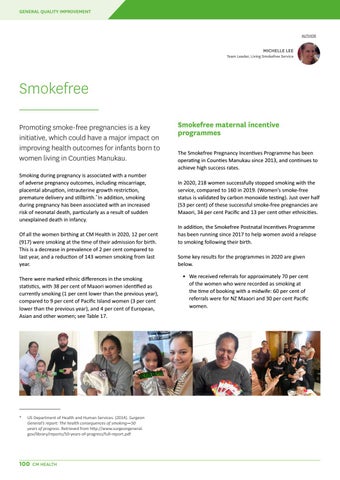GENERAL QUALITY IMPROVEMENT
AUTHOR
MICHELLE LEE
Team Leader, Living Smokefree Service
Smokefree Promoting smoke-free pregnancies is a key initiative, which could have a major impact on improving health outcomes for infants born to women living in Counties Manukau. Smoking during pregnancy is associated with a number of adverse pregnancy outcomes, including miscarriage, placental abruption, intrauterine growth restriction, premature delivery and stillbirth.* In addition, smoking during pregnancy has been associated with an increased risk of neonatal death, particularly as a result of sudden unexplained death in infancy. Of all the women birthing at CM Health in 2020, 12 per cent (917) were smoking at the time of their admission for birth. This is a decrease in prevalence of 2 per cent compared to last year, and a reduction of 143 women smoking from last year. There were marked ethnic differences in the smoking statistics, with 38 per cent of Maaori women identified as currently smoking (1 per cent lower than the previous year), compared to 9 per cent of Pacific Island women (3 per cent lower than the previous year), and 4 per cent of European, Asian and other women; see Table 17.
*
US Department of Health and Human Services. (2014). Surgeon General’s report: The health consequences of smoking—50 years of progress. Retrieved from http://www.surgeongeneral. gov/library/reports/50-years-of-progress/full-report.pdf
100 CM HEALTH
Smokefree maternal incentive programmes The Smokefree Pregnancy Incentives Programme has been operating in Counties Manukau since 2013, and continues to achieve high success rates. In 2020, 218 women successfully stopped smoking with the service, compared to 160 in 2019. (Women’s smoke-free status is validated by carbon monoxide testing). Just over half (53 per cent) of these successful smoke-free pregnancies are Maaori, 34 per cent Pacific and 13 per cent other ethnicities. In addition, the Smokefree Postnatal Incentives Programme has been running since 2017 to help women avoid a relapse to smoking following their birth. Some key results for the programmes in 2020 are given below. • We received referrals for approximately 70 per cent of the women who were recorded as smoking at the time of booking with a midwife: 60 per cent of referrals were for NZ Maaori and 30 per cent Pacific women.






















